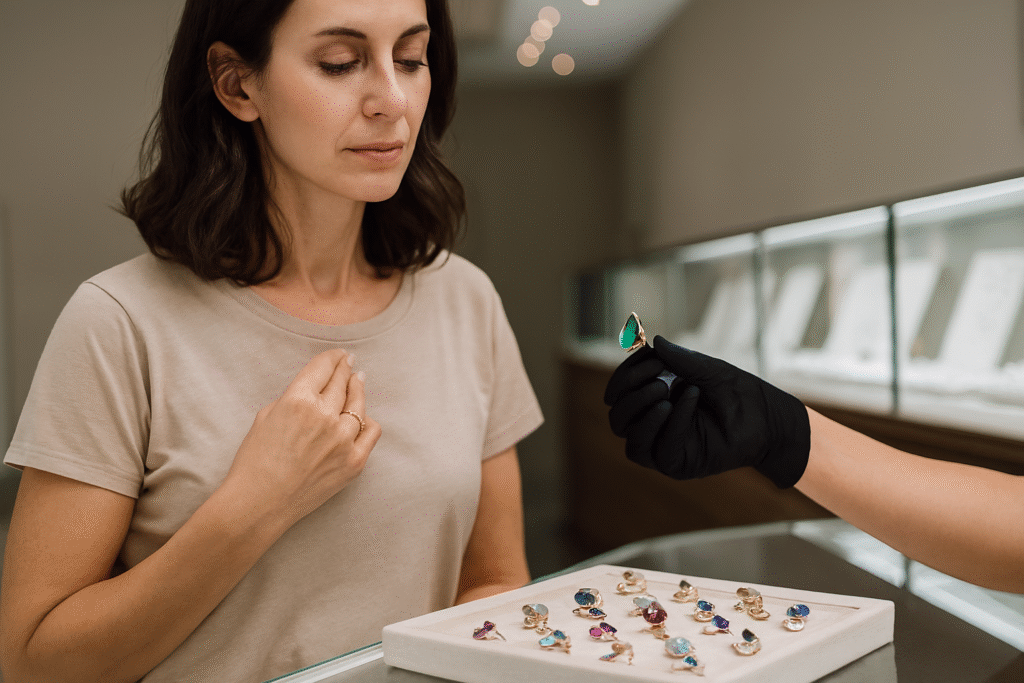Choosing a gemstone isn’t just about rarity or flawless clarity. You need the perfect gemstone for you—one that fits your style, skin tone, and lifestyle.
The key is prioritizing your personal needs over market trends.
A stone may appear flawless on paper. Yet if the color clashes with your skin tone, or the size is impractical, it becomes an accessory you’ll rarely wear. In fact, research shows nearly 60% of buyers regret gemstone purchases because they overlooked personal style or comfort. For deeper insights, see the guide on Gemstones by Color and Skin Tone.
Why the “Perfect” Stone Often Fails
- Skin Tone Mismatch: 62% of buyers select stones that look good in the store but clash with their natural skin tone. As a result, many never wear them. Learn how to avoid this mistake in Gemstone Shopping Tips.
- Lifestyle Conflicts: Large stones can be uncomfortable for daily wear. Therefore, 41% of buyers report avoiding rings they purchased due to discomfort.
- Market Trends vs Personal Taste: Rare or trending stones may look appealing. Yet, your comfort should come first, as explained in the post on Lifestyle Jewelry Choices.
Tips to Choose the Right Gemstone
- Test stones in natural light to check true color.
- Consider durability for everyday wear. For example, check ratings from the GIA Gemological Institute.
- Match size to lifestyle. Rings between 1–3 carats balance elegance and comfort. See examples in Gemstone Durability Ratings Guide.
- Factor in resale value, but above all, prioritize personal enjoyment.
- Try multiple stones before purchase. After all, handling stones yourself often reveals comfort, weight, and visual appeal.
Quote: “A gemstone is only perfect if it feels right for you.”
Q&A: Buying the Perfect Gemstone
Q: Should I buy a gemstone just because it’s rare?
A: Rare stones are tempting. Yet rarity doesn’t guarantee suitability. Therefore, choose a stone that complements your lifestyle.
Q: How do I match gemstones to my skin tone?
A: Warm skin tones suit yellow, orange, and red stones. Meanwhile, cool skin tones pair with blues, greens, and purples.
Q: How do I choose a practical size?
A: Rings between 1–3 carats are most comfortable for daily wear. For instance, many clients report higher satisfaction within this range.
Case Study:
A client chose a flawless 5-carat sapphire. However, she reported daily discomfort and eventually sold it. A 2.5-carat stone would have suited her lifestyle better. As a result, practicality proved more important than rarity.
Learn more:
. Gemological Institute of America: Gemstone grading and care
. American Gem Society: Gem buying guides and ethical sourcing
Introduction
This Responsible Travel FAQ provides comprehensive answers to help you make ethical tourism choices.
Our guide covers eco-friendly accommodations, local community support, sustainable transportation, cultural respect, wildlife ethics, and ways to reduce waste.
Following these practices ensures your adventures benefit both destinations and travelers.
What is Responsible Travel and Why Does It Matter?
Responsible travel means making conscious choices that minimize negative impact while maximizing benefits for local communities and the environment.
Tourism generates $1.4 trillion annually but produces 8% of global carbon emissions.
Your travel decisions affect local economies, cultural preservation, and environmental conservation.
How Do I Choose Sustainable Accommodations?
Look for eco-certifications such as:
- Green Key
- LEED building standards
- EarthCheck approval
- Rainforest Alliance verification
Check if hotels use renewable energy, water-saving systems, and source food locally.
Ask about waste reduction programs and community involvement. Calling properties directly helps verify claims.
Transportation Options for Responsible Travel
- Train travel emits 80% less carbon than flying for similar distances.
- Choose direct flights when necessary and book economy class.
- Use public transport, bicycles, or walk instead of renting cars.
- Consider verified carbon offsets for unavoidable flights.
Supporting Local Economies
- Buy from locally-owned businesses instead of chains.
- Book community-based tours with local guides.
- Eat at family-owned restaurants with local ingredients.
- Stay in homestays or boutique hotels rather than international chains.
- Purchase authentic handicrafts fairly from artisans.
Packing Tips for Responsible Travel
- Reusable water bottle with filtration
- Solid toiletries to reduce plastic
- Reef-safe mineral sunscreen
- Reusable shopping bags
- Bamboo or metal utensils
- Portable laundry soap
Pack light and choose durable, multipurpose items.
Respecting Local Cultures
- Learn cultural customs, dress codes, and etiquette.
- Learn basic local phrases.
- Dress appropriately for religious and conservative areas.
- Ask permission before photographing people.
- Participate respectfully in cultural activities.
Ethical Wildlife Encounters
- Maintain safe distances and avoid feeding animals.
- Choose conservation-focused sanctuaries, not entertainment attractions.
- Avoid elephant rides, direct contact, or photo opportunities with captive animals.
- Use certified naturalist guides who prioritize welfare and habitat protection.
Reducing Waste During Travel
- Use reusable containers, bags, and utensils.
- Refuse single-use plastics.
- Choose digital tickets and receipts.
- Carry a small trash bag where disposal is limited.
Questions to Ask Tour Operators
- Are staff local and fairly paid?
- How does your business give back to communities?
- What environmental practices are in place?
- Are group sizes limited to reduce pressure on sensitive areas?
- Are wildlife experiences ethical and conservation-focused?
Money and Overtourism Practices
- Use local ATMs and tip according to local customs.
- Support social enterprises and cooperatives.
- Visit during shoulder seasons, off-peak hours, or lesser-known areas.
- Stay longer in fewer destinations.
Responsible Travel on a Budget
- Cook using local market ingredients.
- Use public transportation.
- Stay in local hostels, guesthouses, or homestays.
- Explore free cultural events or walking tours.
- Exchange skills or volunteer for free accommodation.
Pre-Travel Research
- Learn about environmental challenges and cultural sensitivities.
- Check seasonal weather and political situations.
- Identify local organizations to support.
- Read destination-specific responsible travel guides.
Creating a Positive Impact Post-Travel
- Share authentic stories on social media.
- Write detailed reviews for responsible businesses.
- Continue supporting local organizations.
- Apply sustainable practices in daily life.
- Recommend responsible travel to others.
Learn more:



